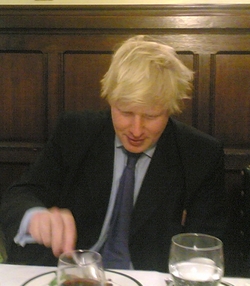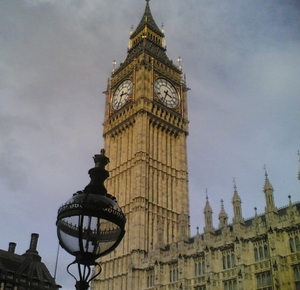If I thought the Tories genuinely would spend £35bn less on “public services” I might even vote for them. However….
|
|||||
Not to be outdone by this bold commitment, the other main parties hastened to make what they believe are equally appealing promises to the electorate. The Liberal Democrats have pledged to increase intelligence if they are elected. A press release issued by their head office (which nobody can actually find) claimed that “average IQs have slipped dramatically under this government”. They promise that the Liberal Democrats are determined to close the “mental wealth gap” by extracting neurons from the brains of very clever people and injecting them into the brains of stupid ones. Meanwhile, the Conservatives have promised to make people taller. Speaking outside Central Office, some chinless mediocrity said that their proposals would help everyone under 5′ 10″ and would result in an average height gain of 3 inches. The Greens have poured scorn on the Conservative proposals claiming that the reason that some people are shorter than others is because tall people are hogging more than their fair share of growth hormones. A Green spokesman..er woman…er thingy, said that the Greens are committed to a programme of genetic redistribution. So the race for election of May 5th is hotting up and if you don’t vote you could well miss out on all these good things. John K added a comment to the Rover over story here last week which Mark Holland liked so much that he reproduced it over at his blog in its entirety. I agree, and had in mind to do something similar here when I first read it. But now that Mark has already immortalised it, I will confine myself to reproducing the final enraged paragraph of what John K had to say about Stephen Byers:
So far so entertaining. We think Byers is a fool. We would. But then last Sunday evening, in the tube, I picked up a discarded copy of the Observer business section. And I later read, on its front page, this piece about the Rover debacle, which contained the following choice invective, also about Stephen Byers:
Something tells me that Byers will not actually pay anything, and incompetence by the standards of normal life is not the same as political incompetence, is it? So he may indeed make a political comeback. However, the fact that Byers is being trashed in the Observer makes me optimistic that this particular incompetent may have had his day. If so, then I guess he will have to go back to Polytechnic lecturing. If they’ll have him. Three newspapers caught my attention today, in relation to what they had to say about the Conservative party. Mark Steyn in the Daily Telegraph pointed out that the Conservative party was not even arguing against the doctrines of social democracy and therefore could not complain with the fact that the forces of an ever larger government were going to win the general election in Britain. If one will not even argue one can not blame the people for siding with one’s opponents. Mr Richard Littlejohn in The Sun newspaper (sorry, not in on-line edition) also argued that timidness of the Conservatives would mean that they had no hope of victory. Finally the Financial Times had on its front page the fact that almost 7 out of 10 voters believed that the Conservative party would put taxes UP if elected to government. I believe that two things are wrong with the Conservative party. One is indeed the timid nature of its policies, as the Economist journal pointed out weeks ago the tax and spend policies of the Conservative and Labour parties are so similar as to be almost indentical. But it is not just a matter of policy, it is a matter of the arbitrary power of the leadership. In the late 1970’s (when the Conservative party was last out of government) many Conservatives showed interest in ideas, they visited the Institute of Economic Affairs, they set up research bodies of their own (such as the Centre for Policy Studies) they freely debated both the practical details of policy and the political principles on which policy should rest. All this has been much more muted in recent times. First, pressure was put on people to only say what the party wished them to say (and this pressure started long before the election campaign) and now first candidates and then an actual member of Parliament have been turned on – turned on for absurdly mild ‘crimes’. First a candidate was told he must stand down because he had been photographed with firearms (that did not even belong to him) in the background of the photograph – this in the party that once represented not just shooting for hunting but the British National Rifle Association and the Constitutional Club network (once stronger in Britian than in the United States). Then a candidate was told he must stand down because the socialist Guardian newspaper had attacked his use of the term creative destruction in relation to the public services. It did not matter that the candidate was simply quoting Joseph Schumpeter (the non Austrian school, Austrian economist). It was not a question of the leadership thinking that, say, Hayek and Mises were better economists than Schumpeter – the leadership of the Conservative party were not interested ideas at all. The Guardian had attacked, so the candidate must go. Then Mr. Flight a member of Parliament (whilst Parliament was still sitting) was told he would not be allowed to stand for Parliament as a Conservative again – regardless of the fact that his Constituency Association and the local voters supported him. His crime? Saying that he thought there was more scope for savings in government spending than the leadership had said. Mr Flight said nothing about ‘secret plans’, but he was not just removed from the Shadow Cabinet, – he was removed from the list of candidates for the Conservative party. It is this “list” that is the key problem. It is not a simple matter of Mr Howard (the leader of the Conservative party) being a bad man – no person should have the arbitary power to effectively expel someone from Parliament simply because they do not happen to like something they have said. It is as if President Bush could expel any Republican from the House of Representatives simply because they said that they thought that there was more scope for savings in government spending than President Bush has said. This arbitrary power of the leadership of the Conservative party did not use to be used liked this (so some fault does go to Mr Howard as an individual), but it is the power itself that must be removed if their is to be a real chance of an intellectual restoration of the Conservative party. The Conservative party was once called by its enemies the ‘stupid party’. Whatever the truth or falseness of this charge, a political party today that is uninterested in ideas, indeed expels anyone who shows an interest, has no chance of returning to power.
Through a remarkable coincidence of timing, families are being encouraged to save lots of money on childcare courtesy of that benevolent Labour Government of ours, launched and promoted during the General Election. Within the Grey household, we are fortuitous enough to have both a private and a public sector employer providing our household income stream and both of them have decided to jump on the employee benefits bandwagon of offering childcare vouchers. The way it works is that an employee agrees to take some of their salary as vouchers (to a maximum of £2,600 a year, i.e. £50/week) and this sum is free of Tax and NI. (The incentive to the employer is that it is free of Employer NI as well). The vouchers can be paper or electronic, they are given or allocated to the carer who redeems them without penalty to the parent and everyone is happy. Or are they? Well, I am not. I have read the forms and there seem to be some ambiguities in the process, which is somewhat convoluted. What happens if I want residual money back because I do not need childcare any more? Not covered. What if I want to pay some on one and some on the other? In theory yes, but the forms I have will not cope with this scheme properly. What happens when the third party scheme management Company makes a pig’s ear of the payments to my son’s nursery (and they will, think every other Government IT project managed by third parties)? What is even more interesting are the online calculators provided by the service providers, the two of which I have looked at being SodexhoPass and Accor. Supposedly, the scheme is simple. To quote Accor,
Sounds good, yes? However… → Continue reading: Election bribes Robert Kilroy-Silk is a laughing stock in sophisticated circles, even in those slightly askew sophisticated circles—sophisticated ellipses?—Samizdatistas belong to. But should he be? A glance at the manifesto of Veritas, the man’s own personal political party, suggests not. Not only is it produced in a deep purple colour that readers of this blog will find comfortingly familiar, but some of the views expressed there wouldn’t be so far out of place here either. Let’s speed past the tosh about immigration, this year’s must-have fearful tic for every pol-about-town, and see what’s hidden in the exotic interior… → Continue reading: Image is everything, unfortunately The UK Labour Party, having set in train the laws making possible the recent postal voting scandal in Birmingham, are no doubt hoping voters forget all about it in a day or so. Former Home Secretary David Blunkett, however, has done his bit to keep the light shining on the issue with a typically idiotic proposal: solve the fraud problem with ID cards. So, let’s get this right. The government, having created a system ripe for fraud and abuse, has one of its former members suggest that it be dealt with creating a system ripe for fraud and abuse. The Tories should give up now. They cannot compete with genius like this. (Side observation: this whole affair underscores why some libertarians don’t believe that democracy is a particularly reliable firewall against the corruption of power). Much has been said about the Labour Party’s election catchphrase “Britain forward not back”. It has been claimed that the phrase was stolen from The Simpsons. As The Times pointed out in February:
At the time of the controversy, I watched Milburn on the TV saying that it wasn’t stolen from The Simpsons. I do believe he was right. It actually came from the Tories. When Michael Howard was elected leader, BBC News wrote:
This sounds like it could have an affect on the forthcoming election, not just on the numbers of votes that go this way or that, but on what gets said during the campaign. It makes our Labour government look bad.
The lawyer representing the accused in this case has just been on Newsnight, and he came as close as you can (with the look on his face rather than with his mere words) to saying that his clients are a pack of liars. That was a fun moment. This is a ticklish matter for the media, because the people doing these frauds are … er … ethnic. Now Sion Simon, a local MP right next to where this happened, and something of a Labour attack dog in the Norman Tebbit mould, is saying that there is no systemic problem. Paxman is being quite rough on him. Simon Hughes for the Lib Dems, and a Conservative whose name I did not catch, are saying that there is a systemic problem. And of course, although this row has been simmering for some time, there is now no time to do anything to the system except urge vote counters and returning officers to be extra-vigilant. Just how bad this will be for the government, I do not know. Maybe in a couple of days it will all be forgotten by almost everybody. But however this particular story plays out in the next few days, I get the feeling that, in Britain now, a political corner has been turned, some time during the last few months. Whether the electorate as a whole has any plans to vote differently remains to be seen. Many of my friends, such as regular Samizdata commenter Paul Coulam to name but one, have said to me that Blair is about to be re-re-elected with a similar majority to last time around, just as Thatcher was. Coulam certainly said this to me a few weeks back. But governments take a long time to unravel, and what does seem to have happened is that the metropolitan media of Britain have got bored with Labour. They are now more bored with Labour than they are disgusted and embarrassed by the Conservatives, which was not true a year ago. Michael Howard may disgust many Samizdata readers by being just another opportunist political hack, but he is nevertheless, I would say, a much more impressive and consequential figure than his two predecessors at the head of the Conservative Party. Now, Paxman is talking about what life is like in North Korea. Apparently people who have tried to escape from that hell hole, to heaven, otherwise known as China, are being executed in public, with everyone else in the town rounded up and forced to watch. Someone even managed to film one of these horror shows, and the BBC showed it. “Worst human rights record of any country in the world.” Count your blessings time. A while ago here I speculated that one of the effects of the Internet – blogs especially – will be to focus attention on what major public figures actually say, and not just to harrass them about their various scandals and cock-ups, worthy though that also is. Well, according to the EU Referendum blog, Michael Howard made quite a good speech the other day about defence, which the media mostly ignored. The two main points were: that Tony Blair is too keen on EU integration and not keen enough on the Atlantic Alliance, and that he does not give Britain’s armed forces the resources to do the many jobs he demands of them. Gabriel might even be cheered up a bit. Not a lot, but a bit. Personally I think that Howard’s two points are closely connected. The smaller our forces are, the easier it will be for the EU to swallow them up. You can read the entire speech here. Today I heavily undermined my Samizdatista credentials by hanging around the political types. I attended a lunch for Boris Johnson’s, MP, supporters and activists from his constituency. Now, you may ask what I was doing there… well, blogosphere works in mysterious ways… The lunch was rather pleasant and I found those I had a chance to talk to refreshingly switched on and open-minded. The shock was made bearable by copious food and wine. Now, to the heart of the matter, Mr Boris Johnson, MP. I was most intrigued, after many months of Tory bashing on this blog, to find myself on the inside and on the receiving end, so to speak. Although the House of Commons is not an unknown territory, this occasion was different as I went curious to meet the one Tory that seems to break the ranks and is not afraid to mention the notion that dare not speak its name in current politics – freedom. The speech Mr Johnson gave at the end of the lunch, before he had to dash off to his statesmanly duties, was… excellent. This is what he had to say (reconstituted from my, by now largely unreadable notes, so please give the man a break and challenge me on the detail): There were three points to note. The first was that freedom is important and needs to be seen as an end in itself, to stop its erosion for other political ends. The Labour government has been spending an increasing amount of taxpayers’ money while reducing their freedom. This is bad for the society. The result is an even more intrusive state under Labour. [So far, so good.] Boris called for a new style of government, which would get that freedom back. He mentioned a rather scary statistic, the size of the public sector is now at the same level as in the 1979 – when Thatcher came in, ending an era of rampant and shameless socialism in Britain – and is 739,000 people working for the central government (excluding local government and other public bodies). By the time Labour came in the number had shrunk to 430,000. The Tories’ agenda is to shrink the size of the state again. The second point was democracy. Democracy means that the Tories get rid of unelected regional authorities and the whole tier of government that has not been approved by the democratic processes. The term constitutional non-sense was mentioned in the context of the health secretary having no say about health. The third issue was taxpayer value. Huge quantities of taxpayer money have been lavished on the public sector and on socially useless projects. New approach to government is needed. [I especially like this one – it was mentioned twice.] Mr Johnson got rather animated when he called for a stop of the ongoing transfer of wealth from the productive sector of the economy to the non-productive. I hope this was a go at wealth redistribution, as his moved on to recommend that the Tories should the party of lower taxation. 
Mr Johnson understands that the size of the cake is more important that the equal size of the cake portions There was the usual pep talk before the elections, which did not come out too badly as it was based on realistic expectations and the belief that Tony Blair should be expelled from the office, which is impossible to disagree with. More issues were discussed, which are either too local or related to the constituency and as such would probably bore the pants off our ‘global’ readership. All in all, talking to Mr Johnson, one could almost believe that politics can be a way forward. They must have put something in the wine… Due to sheer coincidence of seating arrangements I had a chance to exchange a few words with our Honourable Friend and mentioned the distinction between the state and the society that dictates so much of our ‘editorial policy’ on political engagement. It seemed to resonate and I could not help but wonder to what extent the Tory party message could coalesce around such a notion. For the record, I am not holding my breath. |
|||||

All content on this website (including text, photographs, audio files, and any other original works), unless otherwise noted, is licensed under a Creative Commons License. |
|||||





